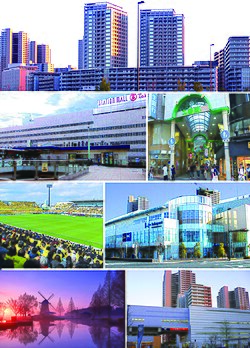Kashiwa
Kashiwa
柏市 | |||||||||
|---|---|---|---|---|---|---|---|---|---|

| |||||||||
|
sunflower | |||||||||
| • Bird | Azure-winged magpie | ||||||||
| Phone number | 04-7167-1111 | ||||||||
| Address | 5-10-1 Kashiwa, Kashiwa-shi, Chiba-ken 270-8505 | ||||||||
| Website | Official website | ||||||||

Kashiwa (柏市, Kashiwa-shi) is a city located in Chiba Prefecture, Japan.[1] As of 2021[update], the city had an estimated population of 433,436 in 194,216 households and a population density of 3800 persons per km2.[2] The total area of the city is 114.72 square kilometres (44.29 sq mi).
The name of the city is written with a single kanji character: 柏, a reference to Quercus dentata, commonly known in English as the Japanese emperor oak or daimyo oak.
Geography
Kashiwa is located on the
Neighboring municipalities
- Chiba Prefecture
- Ibaraki Prefecture
Climate
Kashiwa has a humid subtropical climate (Köppen Cfa) characterized by warm summers and cool winters with light to no snowfall. The average annual temperature in Kashiwa is 14.7 °C. The average annual rainfall is 1358 mm with September as the wettest month. The temperatures are highest on average in August, at around 26.5 °C, and lowest in January, at around 3.9 °C.[4]
Demographics
Per Japanese census data,[5] the population of Kashiwa has been increasing rapidly over the past 70 years.
| Year | Pop. | ±% |
|---|---|---|
| 1950 | 49,159 | — |
| 1960 | 75,594 | +53.8% |
| 1970 | 169,115 | +123.7% |
| 1980 | 272,904 | +61.4% |
| 1990 | 347,002 | +27.2% |
| 2000 | 373,778 | +7.7% |
| 2010 | 404,012 | +8.1% |
| 2020 | 426,468 | +5.6% |
History
Early history
Kashiwa has been settled since ancient times, and was historically part of
Modern history
After the
On September 1, 1954, Kashiwa absorbed neighboring Kogane Town and Tsuchi and Tanaka villages to form the new city of Tokatsu (東葛市, Tokatsu-shi). However, many politicians in Kogane Town were vehemently opposed to the merger, and forced its dissolution on October 15, 1954, with most of former Kogane Town merging with
On April 1, 2008, Kashiwa was designated as a core city, with increased local autonomy. In August 2010, the city population exceeded 400,000 people.
Government
Kashiwa has a
Economy
Kashiwa is a regional commercial center and a
Education
Universities
- Chiba University, Kashiwa Campus
- University of Tokyo, Kashiwa Campus
- Reitaku University
- Nishōgakusha University
- Kaichi International University
Primary and secondary education
- Kashiwa has 42 public elementary schools and 20 public middle schools operated by the city government, and three private combined middle/high schools and one combined middle/high school operated by the Chiba Prefectural Board of Education. The city has eight public high schools operated by the Chiba Prefectural Board of Education and two private high schools. The prefecture also operates one special education school for the handicapped.
Transportation
Railway
- Toyoshiki - Kashiwa - Shin-Kashiwa - Masuo - Sakasai - Takayanagi
![]() Metropolitan Intercity Railway Company - Tsukuba Express
Metropolitan Intercity Railway Company - Tsukuba Express
Highways
Sports
Kashiwa is home to the professional
.Twin towns – sister cities
Notable people
- Shigeyuki Furuki, professional baseball player
- Fumio Imamura, Olympic race walker
- Naoki Ishikawa, professional soccer player
- Kirinji Kazuharu, sumo wrestler
- Kotoshōhō Yoshinari, sumo wrestler
- Masato Kobayashi, professional kickboxer
- Yuri Mitsui, actress, model
- Yōko Oginome, singer
- Takeshi Okano, manga artist
- Megumi Urawa, voice actress
- Kazunori Yamauchi, video game designer
- Shintaro Katsu, actor and singer, died in Kashiwa.
- Yoshitaka Sakurada, politician(former Minister of State for the Tokyo Olympic and Paralympic game).
References
- ^ OCLC 56431036. Archived from the originalon August 25, 2007. Retrieved 2012-07-17.
- ^ "Kashiwa city official statistics" (in Japanese). Japan.
- ^ OCLC 683276033. Archived from the originalon August 25, 2007. Retrieved 2012-07-17.
- ^ Kashiwa climate data
- ^ Kashiwa population statistics
- ^ "姉妹友好都市・ふるさと交流都市". city.kashiwa.lg.jp (in Japanese). Kashiwa. Retrieved 2020-04-10.
